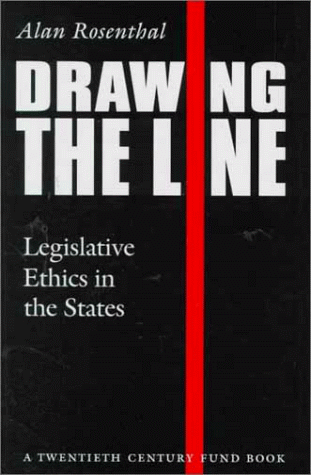Twentieth Century Fund Book
1 total work
"This book should be must reading for every state lawmaker in the country - and for those who seek to influence those lawmakers as well. State ethics codes are a crazyquilt of solutions - some very good and some pretty bad. After studying this book, every legislature in the country would do well to take a hard look at the standards it sets for itself - and to make sure they meet the high standards we have a right to expect of them." - Michael S. Dukakis. "It is easy - too easy - to come up with misleading one-liners about legislative ethics. Alan Rosenthal does a masterful job of showing the inevitable real-world dilemmas and trade-offs that make solutions harder than they appear at first blush. Nevertheless, he does not shy away from offering specific, and sensible, guidelines for action. This book belongs on the "must read" shelf of public figures and scholars alike." - Michael J. Malbin, Center for Legislative Studies, Rockefeller Institute, SUNY, Albany. "Alan Rosenthal has written a thoughtful, enlightening book on the often-chimerical nature of legislative ethics...Scholars and legislators alike will appreciate the well-researched, well-reasoned discussion of difficult, highly politicized issues.
" - Burdett Loomis, author of "Time, Politics, and Policies: A Legislative Year." Scholarly discourse on political ethics and the ethical dilemmas encountered by political practitioners seldom connect. The objective of "Drawing the Line" is to apply ethical principles, reasoning, and judgment to the problems that are encountered by legislators in the fifty states. Legislative bodies have rarely been held in as low esteem as they are today, in part because the integrity of members and of the process is under severe challenge. Legislatures have responded to criticism from the media and the public with law and regulation, but they have yet to take ethics seriously enough. Alan Rosenthal, who has worked with over thirty state legislatures and written previously about the institution and the process, argues that appearance as a standard is weighed too heavily in the deliberation over ethics, while the legislator's responsibility to the legislature and to the legislative process is weighed too lightly. Separate chapters explore conflicts of interest, relationships with lobbyists, and campaign finance, offering recommendations for reform.
Other chapters examine the responsibilities of the legislature for managing its own affairs and promoting ethical conduct among its members. Alan Rosenthal is a professor of political science and public policy at the Eagleton Institute of Politics, Rutgers University. He is also a columnist for State Government News.
" - Burdett Loomis, author of "Time, Politics, and Policies: A Legislative Year." Scholarly discourse on political ethics and the ethical dilemmas encountered by political practitioners seldom connect. The objective of "Drawing the Line" is to apply ethical principles, reasoning, and judgment to the problems that are encountered by legislators in the fifty states. Legislative bodies have rarely been held in as low esteem as they are today, in part because the integrity of members and of the process is under severe challenge. Legislatures have responded to criticism from the media and the public with law and regulation, but they have yet to take ethics seriously enough. Alan Rosenthal, who has worked with over thirty state legislatures and written previously about the institution and the process, argues that appearance as a standard is weighed too heavily in the deliberation over ethics, while the legislator's responsibility to the legislature and to the legislative process is weighed too lightly. Separate chapters explore conflicts of interest, relationships with lobbyists, and campaign finance, offering recommendations for reform.
Other chapters examine the responsibilities of the legislature for managing its own affairs and promoting ethical conduct among its members. Alan Rosenthal is a professor of political science and public policy at the Eagleton Institute of Politics, Rutgers University. He is also a columnist for State Government News.
